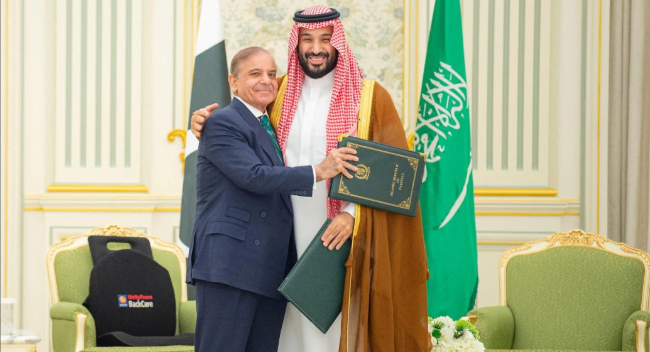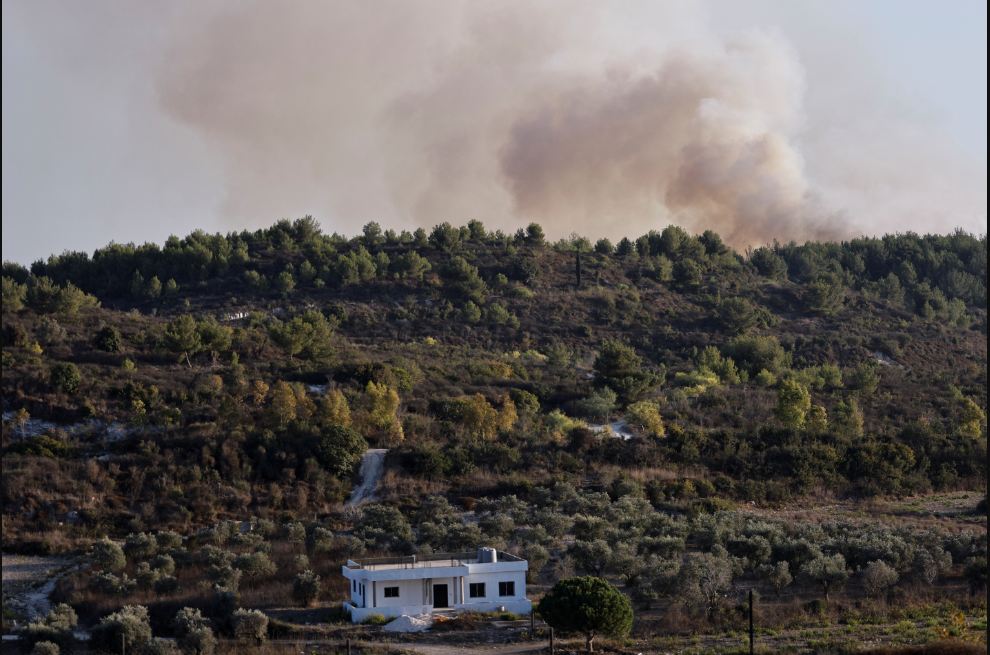Saudi–Pakistan Pact: Pakistan’s Army for Hire—Who Really Benefits?
For Saudi Arabia, the pact is fundamentally about protecting its sovereignty and deterrence posture in a region fraught with volatility.
On September 17, 2025, Saudi Arabia and Pakistan formalized a Strategic Mutual Defence Agreement in Riyadh during Prime Minister Shehbaz Sharif’s state visit. The pact commits both nations to treat any act of aggression against one as an attack against both.
Headlines around the world quickly framed this as a significant geopolitical move. Yet a closer examination reveals a more nuanced reality: the pact is as much about perception as it is about military strategy, serving primarily Riyadh’s security interests while providing Pakistan a temporary boost on the global stage.
For Saudi Arabia, the pact is fundamentally about protecting its sovereignty and deterrence posture in a region fraught with volatility. The Kingdom has faced multiple security threats over the past two decades, from proxy conflicts in Yemen to missile and drone attacks from regional adversaries.
Saudi Defense Minister Prince Khaled bin Salman underscored this perspective when he said, “Any aggressor who seeks to destabilize Saudi Arabia or Pakistan must know that their aggression will be met with a united front.”
While some observers interpret such statements as signaling offensive ambition, the context suggests otherwise. The timing coincided with an Arab-Islamic summit in Doha addressing concerns about sudden military escalations in the Middle East.
Saudi Arabia’s Enduring Reliance on Western Defense Architecture
Despite its ambitions for regional leadership and vast oil wealth, Saudi Arabia’s military capabilities remain fundamentally dependent on Western powers. The United States is the Kingdom’s primary security guarantor, with over $129 billion in active arms deals under the Foreign Military Sales program.
These include advanced systems such as F-15SA fighter jets, THAAD and Patriot missile defense batteries, M1A2 Abrams tanks, and AWACS surveillance aircraft. American personnel routinely train Saudi forces in targeting protocols, civilian casualty mitigation, and operational planning.
In 2019, the U.S. deployed more than 2,700 troops to Saudi Arabia to bolster air and missile defenses amid rising threats from Iran-backed militias—a deployment that underscored Riyadh’s inability to independently deter regional adversaries.
The United Kingdom also plays a significant role, supplying Eurofighter Typhoons and providing technical training to Saudi pilots and ground forces. These Western alliances are not merely transactional; they are embedded in the Kingdom’s defense doctrine. Saudi Arabia’s military procurement, intelligence sharing, and strategic planning are deeply integrated with NATO standards and U.S. operational frameworks.
The western alignment is not diminishing. While Saudi Arabia has sought to diversify its partnerships—engaging with China, Russia, India, and other regional actors—the backbone of its defense remains Western.
The recent pact with Pakistan does not alter this reality. Instead, it supplements Riyadh’s deterrence posture with symbolic Islamic solidarity, while operational alignment on the West continues unabated.
Pakistan’s Rental-Army Service: From Jordan to Bahrain
Pakistan’s military has long served as a readily deployable force, offering manpower, training, and strategic support in exchange for financial aid and diplomatic backing.
This arrangement dates back to the 1970s, when Brigadier Muhammad Zia-ul-Haq—later Pakistan’s president—was stationed in Jordan during the Black September conflict. Zia reportedly led operations against Palestinian factions, helping King Hussein suppress internal dissent. This intervention marked Pakistan’s first major military engagement in Arab internal security.
During the Iran–Iraq War in the 1980s, Pakistan assured Saudi Arabia that any attack on the Kingdom would be treated as an attack on Pakistan. Though never formalized, this political assurance laid the groundwork for future cooperation.
Pakistani troops were rented in Saudi Arabia throughout the decade, providing training and advisory support. In the 1990s, Pakistan rented out thousands of its troops to Saudi Arabia and the UAE during the Gulf War, tasked primarily with internal security and logistics rather than frontline combat.
Perhaps the most recent example of Pakistan’s military outsourcing and renting occurred during the 2011 Iran-backed Shia uprising in Bahrain. As part of the Arab Spring, Bahrain’s Shia majority protested under the auspices of Iran.
In response, the Bahraini government—backed by Saudi Arabia—launched a crackdown. Pakistani media began running recruitment ads for the Bahrain National Guard, seeking former army drill instructors, anti-riot experts, and military police. Within months, over 2,500 Pakistani ex-servicemen were deployed to Manama, increasing the size of Bahrain’s riot police and National Guard by nearly 50%.
The recruitment was facilitated by the Fauji Foundation, a Pakistani conglomerate with deep ties to the military establishment. This episode starkly illustrated Pakistan’s willingness to export and rent its military labor for fellow the Muslim nations.
Strategic Desperation and Institutional Incentives
Pakistan’s willingness to serve as a deployable military partner is driven not by strategic foresight but by economic desperation and institutional self-interest. The country’s economy is in deep crisis.
In 2025 alone, multinational corporations including Microsoft, Shell, Pfizer, and Yamaha exited Pakistan due to political instability, regulatory dysfunction, and currency depreciation. Foreign reserves have plummeted, and debt obligations to the IMF exceed $13.5 billion. Amid this collapse, military outsourcing offers a revenue stream and diplomatic leverage.
The Pakistan Army operates over 50 commercial entities, with assets exceeding $39.8 billion. This military–industrial complex incentivizes external deployments that enhance institutional autonomy and profitability.
Moreover, Pakistan’s strategic doctrine—rooted in Cold War geopolitics—emphasizes influence in neighboring regions, particularly Afghanistan and the Gulf. Military deployments serve this doctrine, allowing Pakistan to project power and maintain relevance in Islamic geopolitics.
The Pakistan Army remains the most powerful institution in the country, often overshadowing civilian governments. Its ability to independently negotiate defense arrangements with foreign states positions it as a transnational actor, capable of shaping foreign policy through military diplomacy.
Yet this autonomy has come at a cost: Pakistan’s military prestige is increasingly tied to mercenary service rather than strategic innovation.
Symbolism Without Substance
The Saudi–Pakistan defence pact, while dramatic in language, does not alter the fundamental asymmetry between the two nations. Saudi Arabia gains a nuclear-armed partner for symbolic deterrence, while Pakistan gains temporary validation amid domestic chaos.
The agreement institutionalizes a relationship that has existed informally for decades, offering symbolism without strategic transformation.
Saudi Arabia’s primary security concerns remain focused on Israel after the recent Qatar episode, and internal dissent—not South Asian dynamics. The pact offers Riyadh a layer of Islamic solidarity, but operational reliance continues to rest on U.S. air defense systems, intelligence networks, and strategic cover.
Pakistan’s role is supportive, symbolic, and ultimately disposable.
In essence, the pact reinforces Saudi Arabia’s broader security posture, complementing its existing defense architecture without compromising its strategic autonomy.
For Riyadh, it is a calculated move—strengthening deterrence through symbolic alignment while remaining anchored to its robust Western partnerships.
For Pakistan, however, the agreement underscores a familiar pattern: seeking relevance through external validation rather than internal reform. It reflects a deeper structural imbalance—where one state consolidates its position through strategic foresight, and the other continues to outsource its military for short-term survival



